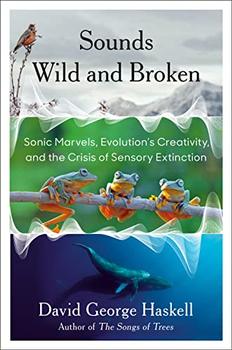
Sonic Marvels, Evolution's Creativity, and the Crisis of Sensory Extinction
by David George Haskell
A lyrical exploration of the diverse sounds of our planet, the creative processes that produced these marvels, and the perils that sonic diversity now faces.
We live on a planet alive with song, music, and speech. David Haskell explores how these wonders came to be. In rain forests shimmering with insect sound and swamps pulsing with frog calls we learn about evolution's creative powers. From birds in the Rocky Mountains and on the streets of Paris, we discover how animals learn their songs and adapt to new environments. Below the waves, we hear our kinship to beings as different as snapping shrimp, toadfish, and whales. In the startlingly divergent sonic vibes of the animals of different continents, we experience the legacies of plate tectonics, the deep history of animal groups and their movements around the world, and the quirks of aesthetic evolution.
Starting with the origins of animal song and traversing the whole arc of Earth history, Haskell illuminates and celebrates the emergence of the varied sounds of our world. In mammoth ivory flutes from Paleolithic caves, violins in modern concert halls, and electronic music in earbuds, we learn that human music and language belong within this story of ecology and evolution. Yet we are also destroyers, now silencing or smothering many of the sounds of the living Earth. Haskell takes us to threatened forests, noise-filled oceans, and loud city streets, and shows that sonic crises are not mere losses of sensory ornament. Sound is a generative force, and so the erasure of sonic diversity makes the world less creative, just, and beautiful. The appreciation of the beauty and brokenness of sound is therefore an important guide in today's convulsions and crises of change and inequity.
Sounds Wild and Broken is an invitation to listen, wonder, belong, and act.
"A joyous celebration of the music of life...Seamlessly melding history, ecology, physiology, philosophy, and biology, Haskell exults in the delightful cacophony created by birds and insects, wind and sea, human voices and musical instruments as he engages in the practice of 'attentive listening' in his travels around the world...Sparkling prose conveys an urgent message." - Kirkus Reviews (starred review)
"[T]houghtful, insightful...Haskell presents a clear-eyed thesis on the impact of worldwide environmental destruction and human noise on what we hear...With persistent intelligence and understated wit, Haskell uncovers one subtle mystery after another, forming a gorgeous argument for protecting all we long to hear." - Booklist
"Sounds Wild and Broken is a symphony, filled with the music of life. It is fascinating, heartbreaking, and beautifully written." - Elizabeth Kolbert, author of The Sixth Extinction
"Listen to David Haskell: He will transform the way you hear the world. Haskell is one of those rare scientists who illuminates his topic—the magnificent natural sonic diversity of our planet, what we have to gain from its richness, what we have to lose from its diminishment—in lyrical, erudite prose that both informs and inspires. This masterful book is a gift of deep aural understanding and a resplendent read." - Jennifer Ackerman, author of The Genius of Birds and The Bird Way
This information about Sounds Wild and Broken was first featured
in "The BookBrowse Review" - BookBrowse's membership magazine, and in our weekly "Publishing This Week" newsletter. Publication information is for the USA, and (unless stated otherwise) represents the first print edition. The reviews are necessarily limited to those that were available to us ahead of publication. If you are the publisher or author and feel that they do not properly reflect the range of media opinion now available, send us a message with the mainstream reviews that you would like to see added.
Any "Author Information" displayed below reflects the author's biography at the time this particular book was published.
David Haskell's work integrates scientific, literary, and contemplative studies of the natural world. He is a professor of biology and environmental studies at the University of the South and a Guggenheim Fellow. His 2017 book The Songs of Trees won the John Burroughs Medal for Outstanding Nature Writing. His 2012 book The Forest Unseen was a finalist for the Pulitzer Prize and the PEN/E.O. Wilson Literary Science Writing Award, and won the 2013 Best Book Award from the National Academies, the National Outdoor Book Award, and the Reed Environmental Writing Award.




Poetry is like fish: if it's fresh, it's good; if it's stale, it's bad; and if you're not certain, try it on the ...
Click Here to find out who said this, as well as discovering other famous literary quotes!
Your guide toexceptional books
BookBrowse seeks out and recommends the best in contemporary fiction and nonfiction—books that not only engage and entertain but also deepen our understanding of ourselves and the world around us.